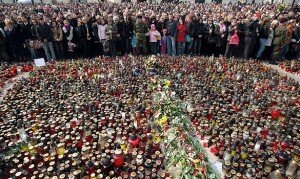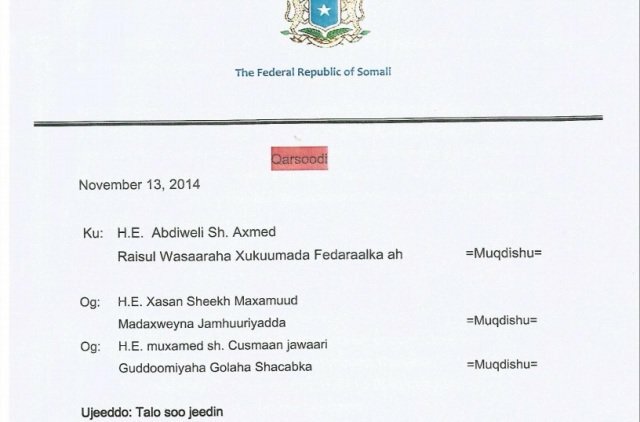Poland stunned by grief and confusion as Lech Kaczynski’s body returns home

Bartamaha (Nairobi):- Lech Kaczynski, the late President of Poland, returned home today to a country struck dumb with grief and confusion.
The air crash yesterday that wiped out the head of state, the chief of the general staff, the chairman of the security services, the central bank governor and Solidarity heroes has left Poland reeling, unsteady and uncertain.
As the red and white Polish flag on the President’s casket flapped in the wind, the honour guard at Warsaw airport struck up the National Anthem. The president’s ashen-faced twin brother Jaroslaw, the Prime Minister, Donald Tusk, and parliamentarians fortunate enough not to have been on the doomed presidential plane, moved their lips to the words of the anthem: Poland has yet to perish/As long as we still live/That which foreign force has seized/We at sabre point shall retrieve.
Then, the casket made its way in a hearse through the streets of the silent capital. Tens of thousands lined the route, rushing in front of the police escort to place carnations on the road, snatching off their hats, dropping to their knees.
The only noise: the revving of hundreds of civilian motorbike riders, waving the national flag, who had decided spontaneously to follow the cortege, like seagulls in the wake of a ferryboat.
“It’s a group trauma,†said a catering entrepreneur, 31-year-old Kaja Burakiewicz, “we’re still struggling to understand.â€
The crash occurred yesterday morning at Smolensk in western Russia. The President had taken with him the cream of Polish society to pay tribute to the 70th anniversary of the Katyn massacres: 22,000 officers and intellectuals, slaughtered in 1940, by Soviet NKVD troops.
Vladimir Putin, the Russian Prime Minister, had previously paid his respects to the victims – but had stopped short of an apology – in a ceremony on Wednesday with his Polish counterpart, Mr Tusk. But President Kaczynski, distrusted and actively disliked by Russian politicians, had not been invited. The pugnacious 60-year-old was determined to have his own, second memorial service – and died in the attempt.
Some relatives of the Katyn murder victims had already made their way on special trains to the old forest clearings where the officers had been shot in the back of the neck, one by one. Early yesterday they waited for the VIPs to arrive. There were rows upon rows of empty seats.
The crowd grew restless. A priest reported that the presidential plane had “technical difficulties” and the ceremony would be delayed. Slowly it dawned on the families – and on all Poles watching the live TV broadcast at home – that something terrible had happened.
A tragedy in a place already weighted by tragedy.
“The place is cursed,†said ex-President Aleksander Kwasniewski. Throughout the weekend, the Poles piece together the circumstances of the disaster that is throwing up so many awkward questions about the future of the country.
The presidential jet was a Tupolev 154 – only Bulgaria, Azerbaijan and Slovakia still use these Soviet machines for Government business – that had recently been serviced in Russia. The pilot flew into a patch of sudden, dense fog, common in the marshy wooded Smolensk region.
Visibility dropped to 500 meters and the control tower warned the pilot after two failed approaches to give up. But the pilot tried a third, and a fatal fourth attempt, smashing into the ground.
Within minutes it was clear that there were no survivors – not even one of the great political survivors of Poland, Anna Walentynowicz.
The 80-year-old retired crane operator helped trigger the Gdansk strike of August 1980 – the moment that gave birth to the Solidarity movement – when she was sacked by the Communist management.
She was one of the few women on board the plane and so far neither her body nor that of the First Lady, Maria Kaczynska, has been identified. Russian and Polish investigators are currently matching seat numbers, passenger lists and corpses, while waiting for the arrival of relatives to make final, positive identification.
The politicians on board were a mixture of the outgoing elite – Lech Kaczynski was deemed unlikely to win re-election in a vote scheduled for October – and young, up-and-coming politicians like Andrzej Kremer, a junior minister in the Foreign Ministry. “He was seen as a future star of EU foreign policy,” said Denis MacShane, former British Minister for Europe, who knew Mr Kremer.
Ryszard Kaczorowski, Poland’s president-in-exile during the Communist years, also perished, as did a bishop, several priests, half a dozen generals, the head of the Polish Olympic Committee, historians and the chief of the national archives.
In the four-hour queue to sign the condolence book at the presidential palace, the mood was not surly, angry or sceptical. “We are praying for Poland,” said 43-year-old teacher Elzbieta Kwiatkowska, clutching a candle.
“Praying that we stay united in the face of catastrophe. It is our way of doing things.”
Yet open questions are nagging the Poles, and are posed in private. Poles have bad experiences with suspicious air crashes: the plane of General Wladyslaw Sikorski, Prime Minister of the Polish Government-in-exile, plunged into the sea off Gibraltar in 1943, shortly after he accused the Soviet Government of ordering the Katyn killings.
Has the curse of Katyn struck again? There is no doubting that the Russians found Lech Kaczynski deeply distasteful. His anti-Russian credentials were so strong that 200 Chechen refugees suddenly appeared among the mourning Poles.
In 2008 the President had flown to Tbilisi with the leaders of Lithuania and Estonia at the outset of the Russian-Georgian war. Only last week a senior Russian commentator accused Mr Kaczynski of stoking up support for the “war criminal” Mikheil Shaakishvilli. Could Mr Putin – who respectfully placed flowers on the dead President’s casket in Smolensk airport – have been involved, asked the Poles. The idea is raised around the dinner table and usually quickly dismissed. But an alternative conspiracy theory is already in circulation – namely that a group of Russian hard-liners, unhappy with Mr Putin’s conciliatory policy towards the West, might have wanted to derail the Russian Prime Minister. So far there’s not the slightest shred of evidence.
The black box retained by the Russian investigators could shed light on a third possibility: that the pilot ignored air traffic control warnings because he was under pressure to land from the President.
The controllers had apparently proposed as alternative airports, Minsk and Moscow. Both would have been unacceptable to the late President.
On his trip to Georgia in 2008 his plane had been refused landing permission in Tbilisi and was forced to touchdown in Azerbaijan. The President had to make his way across the border by car. He was reportedly furious at the time, suspecting Russian malice.
Mr Shaakishvilli talked at the weekend of an “evil act” perpetrated on his friend. Ex-President Lech Walesa also appeared to raise questions about the accident. “Seventy-years-ago the Soviets murdered the political elite in Katyn,” he said. “Now, again, the political elite has been killed on its way to the same place.” For now, there is only the merest hint of a hidden hand.
So far, the Polish Government is keeping state institutions operational. The acting President is now Bronislaw Komorowski, speaker of Parliament. Presidential elections will be brought forward from October to June and Mr Komorowski is the leading candidate. Political commentators speculate that Jaroslaw, the dead President’s twin brother, may run for office. But for the time being, he is completely distraught. Yesterday, he had to fly to Smolensk to identify the body of his identical twin. Today, he knelt on the airport tarmac and kissed the casket containing his brother.
The hearse carrying the President’s body nudged its way through the crowds in front of the palace tonight, the same palace where the Communist Warsaw Pact was once signed.
A week of national mourning has been declared and Ms Kwiatkowska, at least, was determined not to budge until the President is buried. “You can feel the force of us all here,†she said, speaking in front of an urban hillock of flowers. “We will pray through the night, every night, until he is at rest.â€
Echoes of a dark past
Saturday’s disaster has echoes of the death of Poland’s wartime leader-in-exile, General Wladyslaw Sikorski, killed when his plane crashed off Gibraltar in 1943.
The RAF Liberator bomber went down seconds after taking off for England, killing everyone on board except the Czech pilot.
Just before his death, Sikorski had broken off diplomatic relations with Moscow after reports that the Soviet Union had murdered tens of thousands of Polish officers and officials in what became known as the Katyn massacre.
An official British investigation in 1943 attributed the air crash to a technical fault.
Conspiracy theorists have suggested that Sikorski was killed on the orders of Josef Stalin, after demanding an inquiry into Katyn. Soviet aircraft had been parked next to his unguarded plane.
—————-
Source:-timesonline
Comments
comments
 Calendar
Calendar




































